Gut Health 101: Your Complete Guide to a Healthy Microbiome
Learn how improving gut health boosts digestion, mood, and energy. Discover our recommendations, habits, and tips for a balanced gut-brain connection.

Why Gut Health is the Hottest Topic in US Wellness
You might have heard the term "gut health" popping up everywhere, and for good reason: the health of your digestive tract is foundational to your entire well-being. It’s more than just digestion; it’s about a complex ecosystem inside you that affects your mood, immunity, and energy.
- The U.S. Digestive Health Market is valued at over $6.2 billion, indicating massive consumer interest in proactive solutions rather than just reactive treatments like antacids.
What is Gut Health and the Microbiome?
Your "gut" is your gastrointestinal system, a long tube that runs from your mouth to your colon, responsible for breaking down food and absorbing nutrients.
The Gut Microbiome is the community of trillions of bacteria, fungi, and viruses living primarily in your large intestine. These tiny residents are often called your "second brain" because of their profound influence. A healthy gut is defined by having a diverse and balanced microbiome with limited digestive symptoms. This diversity is key: the more species of beneficial bacteria you have, the more resilient your gut—and your body—is.
The Profound Importance of Gut Health
The health of your gut microbiome affects nearly every system in your body. It is understood that a healthy, diverse gut is linked to:
- The Immune System: Approximately 70% of your immune system resides in your gut. A strong gut lining and a balanced microbiome are your body's first line of defense against pathogens.
- Mental Health (The Gut-Brain Axis): Your gut produces over 90% of the body's serotonin, a key mood-regulating neurotransmitter. Imbalance (dysbiosis) can signal distress to the brain, contributing to anxiety, depression, and "brain fog."
- Weight and Metabolism: Gut bacteria help break down food and extract calories. Certain bacterial strains have been linked to healthy weight management and insulin sensitivity, affecting your risk for conditions like Type 2 Diabetes.
- Sleep and Fatigue: Gut dysbiosis can impact the production of hormones and inflammatory markers that interfere with sleep patterns, often leading to chronic fatigue.
Buyer's Guide
How to Choose the Best Gut Health Supplement
Since the FDA does not strictly regulate supplements, finding a product that works requires an informed approach. Follow these steps when shopping:
| Feature to Look For | Why It Matters |
| High CFU Count | Look for at least 1 Billion to 10 Billion Colony Forming Units (CFUs) per dose. More isn't always better, but it ensures you get enough live bacteria to make an impact. |
| Specific Strains | The label should list the genus, species, and strain (e.g., Lactobacillus rhamnosus GG). Reputable brands use clinically studied strains like Lactobacillus and Bifidobacterium for specific benefits. |
| Storage Instructions | Many strains are sensitive to heat and moisture. Choose products that guarantee CFUs at expiration and adhere to refrigeration or shelf-stable instructions. |
| Inclusion of Prebiotics | The best products are often synbiotics (combining prebiotics and probiotics). Prebiotics (e.g., inulin, FOS) are the "food" that helps the probiotic bacteria survive and thrive. |
| Third-Party Testing | Look for certifications like NSF or USP to ensure the pill contains what the label claims and is free from contaminants. |
Top Products
Garden of Life Dr. Formulated Probiotics Once Daily (Probiotic)
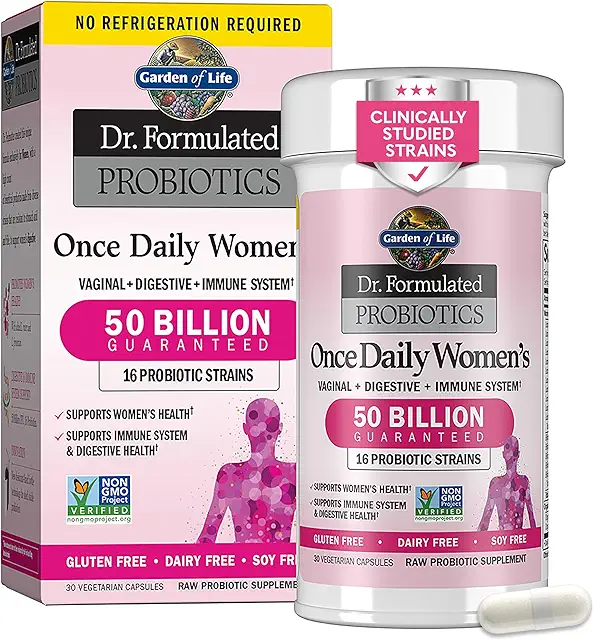
- Expert Rating: 4.6 / 5 Stars
- Pros (Why It Ranks Well): High CFU (50 Billion), Diverse Strains (15 strains), Shelf-Stable, and USDA Organic/Non-GMO verified. Includes a prebiotic fiber blend.
- Cons (Common Complaints): Slightly higher price point. High CFU count may cause mild initial gas/bloating for sensitive users.
- Editor's Choice: YES
Renew Life Ultimate Care Probiotic Capsules
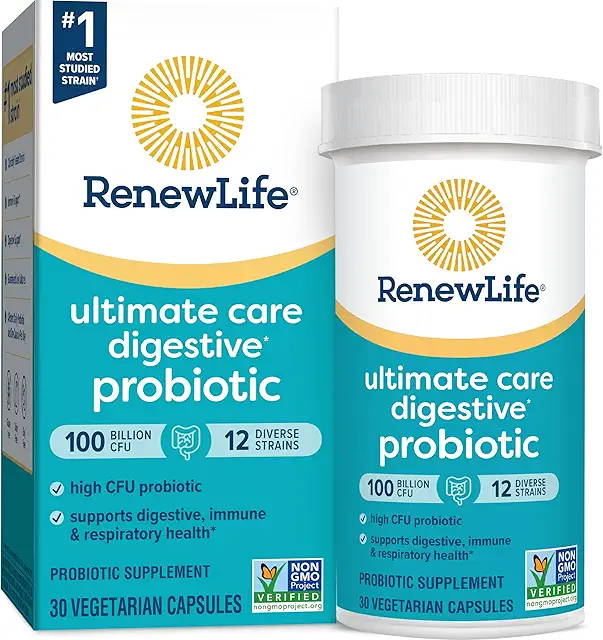
- Expert Rating: 4.7 / 5 Stars
- Pros (Why It Ranks Well): Exceptionally high potency (50-100 Billion CFU). Targeted for severe digestive distress or use post-antibiotics. Delayed-release capsules ensure survival.
- Cons (Common Complaints): Must be refrigerated. High potency should not be taken long-term without professional advice.
Metamucil Psyllium Fiber Supplement (Prebiotic Fiber)
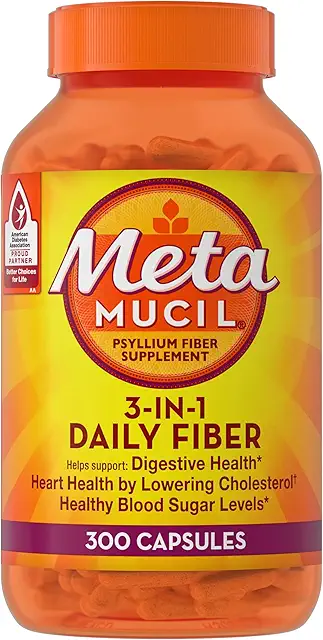
- Expert Rating: 4.5 / 5 Stars
- Pros (Why It Ranks Well): The #1 Doctor-recommended brand. Pure psyllium husk provides a massive boost of soluble fiber to promote regularity and heart health.
- Cons (Common Complaints): Must be mixed with water quickly or it gels. It can cause significant gas/bloating if water intake isn't increased.
NOW Supplements Acidophilus & Bifidus (Budget Probiotic)
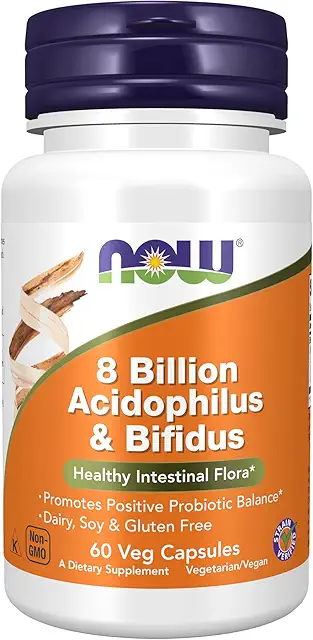
- Expert Rating: 4.5 / 5 Stars
- Pros (Why It Ranks Well): Excellent value and affordability for consistent daily use. Contains the essential Lactobacillus and Bifidobacterium strains.
- Cons (Common Complaints): Lower CFU count (10 Billion) and fewer diverse strains compared to premium options.
Amazing Grass Green Superfood Powder (Greens & Prebiotic)
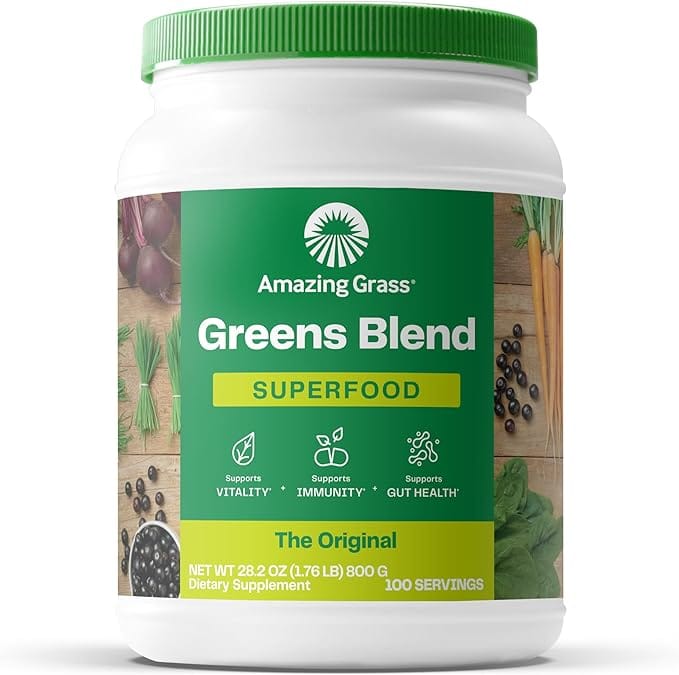
- Expert Rating: 4.4 / 5 Stars
- Pros (Why It Ranks Well): Provides whole-food fiber and prebiotics from organic greens (wheat grass, barley grass), plus digestive enzymes, addressing multiple areas of gut health.
- Cons (Common Complaints): Taste can be earthy or "grassy," requiring mixing with strong flavors like fruit or juice.
Our Recommendation
Garden of Life Dr. Formulated Probiotics Once Daily. This product is the editor's choice because it strikes the best balance of being a reputable, clinically studied brand with a high-potency, diverse formula (50 Billion CFU, 15 strains) that includes a prebiotic. Its shelf-stable format and commitment to clean ingredients (Non-GMO, Organic) make it highly accessible and a reliable daily foundation for the average U.S. consumer.
How to Improve Your Gut Health (The Lifestyle Approach)
While supplements help, a healthy gut is primarily built on lifestyle habits:
- Eat a Fiber-Rich, Diverse Diet: The single best thing you can do is eat a wide variety of whole, unprocessed plant foods—fruits, vegetables, legumes, and whole grains. Aim for 30 different plant foods a week.
- Prioritize Prebiotics: Fertilize your gut bacteria with foods like garlic, onions, asparagus, bananas, and oats.
- Include Fermented Foods (Probiotics): Add natural sources of beneficial bacteria like unsweetened yogurt, kefir, sauerkraut, kimchi, and kombucha.
- Manage Stress: Stress hormones (like cortisol) can slow digestion and shift the balance of your microbiome. Incorporate regular stress-reducing activities like meditation, deep breathing, or yoga.
- Get Enough Sleep: Chronic lack of sleep has been shown to negatively alter the gut microbiome. Aim for 7-9 hours of quality rest per night.
- Stay Hydrated: Water is essential for every gut function, helping to break down food, absorb nutrients, and soften stools.
- Exercise Regularly: Physical activity stimulates the muscles of the gut (motility) and has been shown to increase microbial diversity.
Frequently Asked Questions (FAQs)
Q: How do antibiotics affect my gut, and what should I do?
A: Antibiotics are powerful medications that fight harmful bacteria, but they don’t discriminate—they also affect the “good” bacteria living in your gut. Your gut microbiome is home to trillions of microbes that play a huge role in digestion, immunity, and even mood. When antibiotics wipe out large portions of these beneficial bacteria, you may notice side effects like:
Digestive issues: bloating, gas, diarrhea, or constipation.
- Reduced immunity: since 70% of your immune system is in the gut.
- Imbalance (dysbiosis): harmful bacteria or yeast can overgrow when the good ones are suppressed.
- Mood or energy changes: because of the gut-brain connection.
What you can do to protect your gut during and after antibiotics:
- Take probiotics (with guidance): Adding probiotics—either through supplements or foods like yogurt, kefir, kimchi, and sauerkraut—may help replenish beneficial bacteria. It’s often best to take them a few hours apart from your antibiotic dose.
- Eat prebiotic-rich foods: These are the “fertilizer” for your gut bacteria. Foods like garlic, onions, bananas, oats, and asparagus help the good microbes recover and thrive.
- Stay hydrated: Antibiotics can sometimes irritate your digestive system. Drinking water helps keep things moving and supports recovery.
- Avoid excess sugar and processed foods: These can feed harmful bacteria and slow down the rebalancing of your gut.
- Give it time: Most people’s gut microbiome begins to recover within weeks to months after finishing antibiotics, but supporting it with good lifestyle habits speeds up the process.
Antibiotics are sometimes necessary and lifesaving, but they can disrupt your gut health. Pairing them with smart nutrition, probiotics, and self-care can help restore balance and keep your gut (and overall health) on track.
Q: Do diet soda or artificial sweeteners hurt my gut health?
A: There’s a lot of debate around this question, and the truth is a bit nuanced. Diet sodas and artificial sweeteners (like aspartame, sucralose, or saccharin) don’t contain sugar, so they’re often seen as a “healthier” option compared to regular soda. But when it comes to gut health, here’s what research and experts suggest:
- Artificial sweeteners can affect gut bacteria.
Some studies show that certain sweeteners (especially saccharin and sucralose) may alter the balance of gut microbes. A disrupted microbiome can influence digestion, metabolism, and even mood. - Not all sweeteners act the same way.
Natural alternatives like stevia or monk fruit tend to have less impact on gut bacteria compared to older artificial sweeteners. This means swapping one type of sweetener for another can make a difference. - The impact may depend on the person.
Some people are more sensitive to changes in their gut microbiome than others. While one person may notice bloating or digestive discomfort, another might not experience any issues at all. - Diet soda isn’t just about sweeteners.
Many diet sodas contain acids and additives that can irritate your gut or wear down enamel. They won’t “kill” your gut health outright, but they aren’t gut-friendly if consumed in large amounts. - Moderation matters most.
Drinking an occasional can of diet soda probably won’t harm your gut health in a meaningful way. But relying on it daily as your main beverage could have cumulative effects. Water, herbal teas, and probiotic-rich drinks (like kefir or kombucha) are much better long-term choices.
Artificial sweeteners and diet soda may negatively affect gut health by disrupting the microbiome, but the effects vary by individual and by sweetener type. If you’re concerned about your gut health, it’s best to limit diet soda, experiment with natural sweeteners, and focus on a fiber-rich, whole-foods diet that supports beneficial gut bacteria.
Q: What are the main signs that I have an unhealthy gut?
A: Your gut does much more than digest food—it influences your immune system, energy levels, skin health, and even mood. When your gut isn’t balanced, your body often sends out signals. Some of the main signs of an unhealthy gut include:
- Digestive issues
- Frequent bloating, gas, constipation, diarrhea, or heartburn can all point to an imbalance in gut bacteria or poor digestion.
- Food intolerances or sensitivities
- If you notice discomfort, cramps, or fatigue after eating certain foods, it may be a sign that your gut struggles to process them properly.
- Unexplained fatigue or sleep problems
- The gut produces neurotransmitters like serotonin that regulate sleep and mood. Imbalances may leave you feeling tired, foggy, or restless at night.
- Frequent illness or weakened immunity
- A large part of your immune system is in the gut. If you get sick often, your gut microbiome might not be supporting immune function as it should.
- Skin conditions
- Issues like acne, eczema, or rosacea can sometimes be traced back to inflammation or imbalances in the gut.
- Mood changes and brain fog
- Because of the gut-brain connection, anxiety, depression, or difficulty concentrating can be linked to poor gut health.
- Unexplained weight changes
- Struggling with weight gain or loss despite no big changes in diet or exercise can indicate your gut bacteria are affecting metabolism.
If you experience several of these signs regularly, it may be worth looking at your diet and lifestyle—or consulting a healthcare professional. Improving gut health with fiber-rich foods, probiotics, stress management, and good sleep can make a noticeable difference in how you feel overall.
Q: Is it better to get probiotics from food or supplements?
Both probiotic foods and supplements can benefit your gut health, but which one is “better” often depends on your lifestyle, health goals, and personal preferences. Here’s a breakdown:
Probiotics from Food
Examples: Yogurt, kefir, sauerkraut, kimchi, miso, kombucha, tempeh.
Pros:
- Naturally contain beneficial bacteria along with other nutrients (vitamins, minerals, fiber).
- Often easier for your body to absorb because they come in a whole-food form.
- Support a diverse gut microbiome when eaten regularly as part of a balanced diet.
- Usually, they are more affordable than supplements.
Cons:
- Potency and strains vary by food type and preparation method.
- Not suitable for everyone (e.g., lactose intolerance, food sensitivities).
- May not deliver high concentrations of specific probiotic strains needed for certain conditions.
Probiotics from Supplements
Available as capsules, powders, or liquids with specific strains like Lactobacillus, Bifidobacterium, or Saccharomyces boulardii.
Pros:
- Controlled dosage and clearly labeled strains and CFUs (colony-forming units).
- Convenient for people who don’t regularly eat probiotic foods.
- Helpful for targeted use (e.g., after antibiotics, for IBS, or traveler’s diarrhea).
- Can combine with prebiotics for added gut health benefits.
Cons:
- Quality varies widely between brands; not all supplements survive stomach acid to reach the gut.
- It can be more expensive.
- May cause mild side effects like bloating or gas, especially at first.
Which is better?
For most people, a mix of both works best. Regularly including probiotic-rich foods in your diet supports overall gut health naturally, while supplements can fill gaps or provide extra support when you need higher doses or specific strains.
If you’re dealing with a medical condition or digestive issues, talk to a healthcare provider to find the right balance and strains for your needs.
Bottom line: If you want everyday gut support, start with whole foods. If you’re aiming for targeted results (like restoring gut balance after antibiotics), supplements may be the more reliable option.
Q: Can I cure my IBS (Irritable Bowel Syndrome) with gut health products?
The honest answer is that there isn’t a “cure” for IBS right now. IBS is a complex condition that involves how your gut and brain communicate, and symptoms vary widely from person to person. That means what helps one person might not fully work for another.
That said, certain gut health products and lifestyle changes can absolutely help manage symptoms and improve quality of life. Here are some key points:
- Probiotics
Some people find relief by taking probiotics, which support a healthier gut microbiome. Specific strains (like Bifidobacterium infantis or Lactobacillus plantarum) have been linked to reduced bloating, cramping, and irregularity. Results, however, can take a few weeks and may not work for everyone. - Prebiotics & Fiber Supplements
Soluble fiber (like psyllium husk) can help regulate bowel movements without causing as much gas or discomfort as insoluble fiber. Prebiotic supplements feed healthy gut bacteria, though some IBS patients may experience extra bloating initially. - Digestive Enzymes
For people who notice symptoms after eating certain foods (like lactose or high-FODMAP foods), digestive enzymes may help break down those triggers and reduce discomfort. - Lifestyle & Diet
Products alone often aren’t enough. Many people benefit from a low-FODMAP diet, stress management (since stress heavily influences IBS), staying hydrated, and regular exercise. - Medical Guidance
Since IBS symptoms can overlap with other digestive conditions, it’s best to consult a doctor before relying solely on supplements. A healthcare provider can help rule out more serious issues and guide you on which products are worth trying.
Gut health products like probiotics, prebiotics, and fiber supplements can be part of an IBS management plan, but they aren’t a cure. The best results usually come from a combination of products, dietary adjustments, and lifestyle changes, tailored to your unique triggers.
Key Takeaways
The health of your gut microbiome is not a fleeting trend; it is the cornerstone of your overall health. By focusing on a diverse, fiber-rich diet, smart supplementation, and proactive stress and sleep management, you are taking the most powerful steps toward not only a comfortable digestive system but also a stronger immune system, a clearer mind, and a more energized life. Your gut is talking—it’s time to listen.
